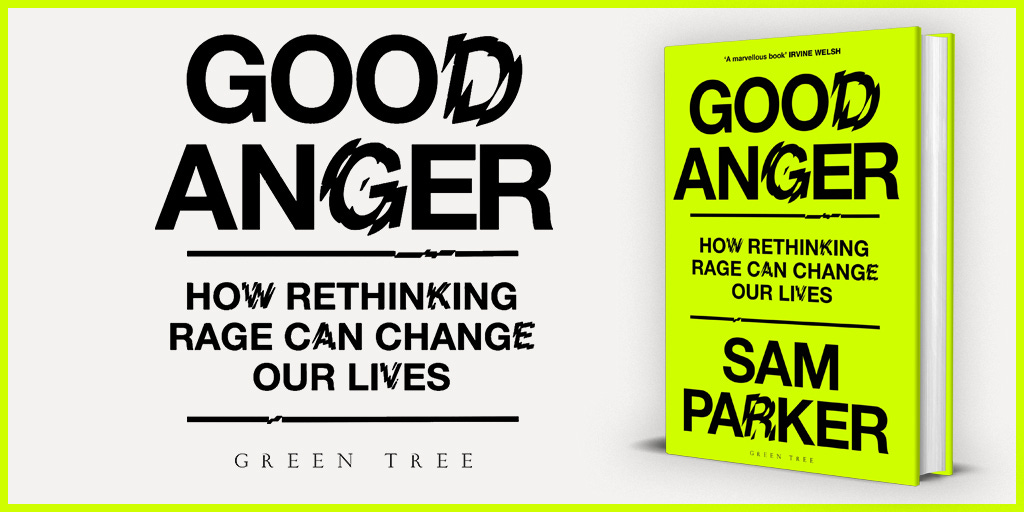Good Anger is out today! Here's why you should care
This week I walked around bookshops signing copies of my new book. Here are the reasons I – and others - recommend you pick one up
Yesterday was publication day for my first book, Good Anger. I visited various shops in central London, sheepishly asking if they’d like me to sign a copy (it turns out those ‘signed author copies’ you see on shelves are, more often than not, enthusiastic authors contacting book shops rather than other way around). I had my 5-month-old daughter strapped to me, which means she got to witness her Dad fulfil a promise I made to myself when I was a child walking around libraries: one day I’ll have my name on one of these.
Funnily enough, the moment I felt most excited was not seeing a copy on the shelf in Waterstones Piccadilly for the first time, but when a nice assistant with a beard in Foyles told me they’d already sold one that morning. Down the road at Waterstones Trafalgar Square, a copy was already mysteriously wrapped and tucked aside on the reserved shelf. They wouldn’t say who’d ordered it – confidentially is important – but I signed it anyway. Apologies to whoever that was in case they’d have preferred a version without a scribble in it.
I’ve tried to walk a line on Substack between documenting the experience of having a book published, in the hope that it offers some solidarity or insight to the other writers on here, and actually trying to convince anyone to buy the thing. Given it is publication week, I thought I really ought to shift gear into the latter. So here goes.
What other people are saying about Good Anger
Last week, The Independent named Good Anger the Non-Fiction Book of the Month, along with 5 stars. I was thrilled the reviewer, Martin Chilton, found it “packed with insight”, “powerful and engaging” and “a potent defence of a vilified emotion” – along with being rather funny, which is secretly the feedback I like the most. I talked about the experience of receiving your first review in a post which also featured an extract from the start of the book last week.
The rights to Good Anger have been bought in Greece, Holland, Spain, China and America, where it has already been selected as a must-read title by Malcolm Gladwell’s book club, The Next Big Idea. So far I’ve been interviewed about the book for pieces in the Guardian, iPaper, Daily Express, Good Housekeeping, which are being published soon, and written about aspects of it in the The Observer (‘The upside of anger: harnessing our most explosive emotion’), Independent (‘Are you guilty of wellness bypassing?’) and this weekend’s Sunday Times.
Dr Aaron Balick, author of The Psychodynamics of Social Networking, called Good Anger “compulsory reading” and “grounded in wisdom across time and culture”. Kate McCann from Times Radio called it “wise and quietly revolutionary” and “one of those books you’ll want to buy for the people closest to you”. Irvine Welsh – legendary author of Trainspotting – called it “A marvellous book which enhances our understanding of ourselves and others”. I’m grateful for all this early feedback and can’t wait to hear more from people now the book is officially out in the world.
What I am saying about Good Anger
From the start, I wanted to write a book about anger for people who thought they didn’t need one. We still think of the person with ‘anger issues’ as the man with the red face who can’t stop losing his temper in traffic and looks on the edge of giving himself a hernia.
But in Good Anger I talk specifically about people with what I call ‘the other anger problem’. That’s the people pleasers and conflict avoiders who suppress their rage, often without realising they’re even doing it. We are the ones who say ‘I’m not really an angry person’ while secretly flooding our bodies with cortisol each time we bite our tongues, become passive-aggressive without meaning to, or just turn our anger into vindictive self-talk, which exacerbates feelings of depression and anxiety.
Here’s the point: we all have anger issues, just some of us display it outwardly, and some of us keep it a private ordeal. It’s the latter, overlooked majority I found myself in, and spent years getting professional help to try and escape.
Here’s what I am confident you will get out of buying Good Anger:
A new way of conceptualising anger and what it is for. Not as the same thing as aggression or violence, which are behaviours, or an inherently harmful or negative feeling, but a helpful, energising, self-protecting emotion with incredibly useful insights to offer if you learn how to listen to them properly.
A deeper understanding of where our fear and shame around anger comes from, both its long roots in human history and our individual stories.
A pathway to using your body to locate, test out and grow your capacity for showing healthy anger.
Practical, useful, applicable, real advice on getting better at expressing anger online, at work, and around the people you love. Not just from me, but some of the most clued up psychologists, workplace experts, scientists and artists in the world.
A fair bit on emotional regulation, emotional intelligence, the role healthy anger plays in treating depression and anxiety, improving our self-esteem and, as The Independent put it, “wisdom about tackling unhappiness”.
At least one joke about dating app profiles in ancient Rome.
OK that’s it, my pitch. I’m off to bother some more bookshops.
Good Anger: How Rethinking Rage can Change our Lives is available in shops now, or can be ordered online at Amazon or Waterstones.






I've just been talking about anger and how valid it is with my therapist so I'm going to give this a read 😁
Congrats will pick up a copy...everyone should.